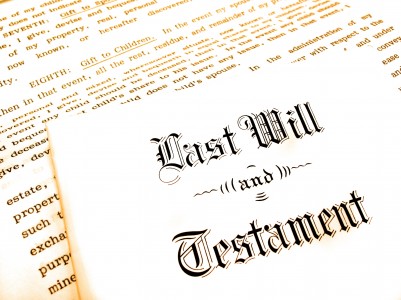Wills and probates are among the best tools a family history researcher can use in his/her research. This RecordClick genealogist finds them both helpful and enlightening. A will can be a plus in helping you find out more about a family, but if a will or probate doesn’t exist (the individual died intestate) that is entirely okay. To understand the difference between the two: 1) the will states how the deceased wanted the estate disposed; 2) the probate, which is the process of settling an estate, is extremely helpful because it explains what actually happened.
When my mother died, she left a rather standard will stating that her goods and property were to be sold with the proceeds divided equally among my siblings and me. While my family worked together harmoniously, I have seen some close families disintegrate during the process of deciding who gets what. Others families handle the loss of a loved one and settle the estate with little more than impatience with the court system. Whatever the probate experience, all the particulars are made available in the probate files, and those are as good as gold to family genealogists.
In working with wills and probates, genealogical researchers can find out when an individual died, what the individual owned, who the family members were, who were alive and who were dead, the last names of married females, possibly the names of grandchildren, and where families lived. All of this information, especially the names and the places, can lead to finding living relatives.
As family historians know only too well, sometimes there is neither a will nor probate for reference. In order to probate an estate, there has to be something of value to be passed on. Quite often the key to having an estate is land ownership, but bear in mind that laws vary on how land ownership is handled in a probate, especially based on what state you’re in and what time period you are dealing with. However, there are some steps to probating an estate that fit almost all situations.
One of the first steps in probating an estate is the appointment of an administrator. I’m going to use one of my g-g-g-grandfathers as an example. His probate was No. 11 in Saunders County, Nebraska:
“In the County Court of Saunders County, Nebraska.
“Your petitioner, J.C. Biggerstaff, the son of said Samuel Biggerstaff late of said County, deceased, respectfully states that said Samuel Biggerstaff departed this life on the 30th day of January 1889; that he was, immediately preceeding his death, a resident of said County. Your petitioner furthers shows that no last will and testament of said deceased has been discovered, nor is your petitioner aware of the existence of any such instrument, and your petitioner believes that said Samuel Biggerstaff died intestate leaving Real estate in said county to be administered, valued at about $2500. The heirs at law of deceased are Anna Biggerstaff, widow of deceased; Aliso (sic) Biggerstaff, William Biggerstaff, Menerva (sic) Miller, J.C. Biggerstaff, Mary Smith, Samuel Biggerstaff Junior, Clarenda Kaizer (sic), sons and daughters of said deceased.
“Wherefore petitioner prays that letters of administration may be granted to Elija (sic) Biggerstaff up the goods, chattels, rights, credits of said Samuel Biggerstaff, deceased.”
This document holds a wealth of information. Just look what we can glean from the passage above:
- Name of the deceased
- Date of death
- Residence
- There was no known will
- What Samuel Biggerstaff had of value to be probated and its estimated worth
- Names of his surviving family members
Resolving a probate case can take anywhere from a few months to many years. With all that has to be handled, don’t be surprised if you find more than one list of family members and residences.
Working with wills and probates has its pluses and minuses for genealogical researchers. The plus side is that probates are court records and are usually open to the public. In most cases, they are indexed with a good many having been filmed or digitized. The records are frequently dated, which place family members in a specific place on a specific date.
To begin a search, first check FamilySearch. More than half of the states have at least some probate record images online. The Family History Library has microfilmed copies of probates, and these microfilms can be loaned to local Family History Centers for viewing.
On the minus side, if the probate has not been filmed or digitized, the family history researcher will have to make a trip to the courthouse, or find someone to make the trip to do the research. In more populated counties, the court (often County Court) where probates are handled can be busy. In less populated areas, there may be a regular court day when the judge is present, and things are more active. I like to visit courthouses on slower days. Don’t expect to get all the information in 10 or 15 minutes. Some probates are simple while others can be quite complicated.
Are you interested in checking to see if there might be probates in your family that can help break down that ancestor search brick wall, or help you find a long lost cousin? Does the research seem a bit more complicated than you thought? Are you unable to travel to the county courthouse where the probate is filed? The expert genealogists at RecordClick can help. We have a network of genealogical researchers across the United States ready to assist you. We can check the online images at FamilySearch or possibly organize a courthouse visit.
Don’t miss Joan’s upcoming article that continues to explore the value of probates to the genealogist – Probate and the Genealogist: A Match Made in Heaven.







